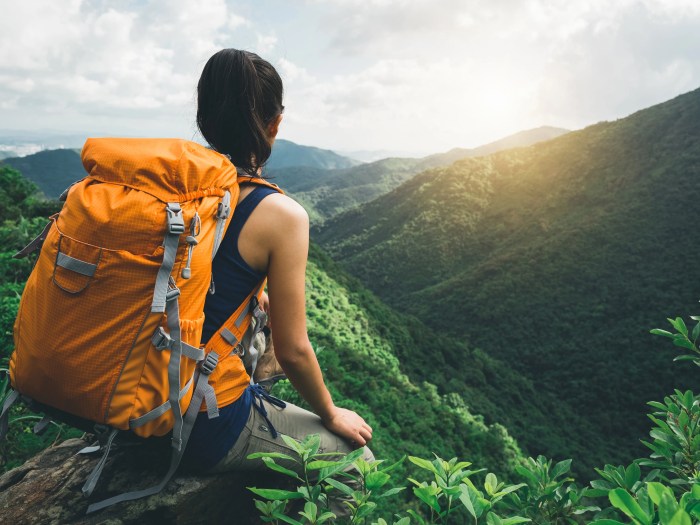Backpacking Holidays: Imagine swapping boardrooms for breathtaking vistas, deadlines for dazzling sunsets. This isn’t just travel; it’s a transformative experience, a deep dive into cultures, and a chance to reconnect with yourself amidst the raw beauty of our planet. We’re peeling back the layers of this adventure travel style, revealing everything from meticulous planning and budget management to safety precautions and capturing unforgettable memories.
Get ready to ditch the itinerary and embrace the unexpected.
This comprehensive guide unpacks the essence of backpacking holidays, comparing them to other travel styles and exploring various backpacking approaches – from budget-conscious jaunts to adrenaline-fueled adventures. We’ll delve into practical planning, crafting sample itineraries, essential packing lists, and smart financial strategies. Safety and well-being are paramount, so we’ll cover health precautions, emergency procedures, and the importance of travel insurance.
We’ll also showcase inspiring destinations, emphasizing responsible travel and sustainable practices, and provide tips for visually documenting your incredible journey. Let’s turn your wanderlust into a reality.
Environmental Impact and Sustainable Practices: Backpacking Holidays

Backpacking, while offering incredible adventures and personal growth, undeniably leaves an environmental footprint. The sheer number of backpackers globally, coupled with the often-remote and fragile ecosystems they traverse, necessitates a serious examination of our impact and the adoption of sustainable practices. Ignoring this responsibility not only damages the very environments we seek to enjoy but also undermines the long-term viability of backpacking as a leisure activity.The environmental impact of backpacking tourism is multifaceted.
From trail erosion and wildlife disturbance to water pollution and the generation of waste, the cumulative effect of countless individual trips can be significant. The increased demand for resources in popular backpacking destinations, such as water and fuel, also places a strain on local ecosystems. Understanding this impact is the first crucial step towards mitigating it.
Minimizing Environmental Footprint During Backpacking
Reducing your environmental footprint while backpacking requires a conscious effort and commitment to responsible practices. This involves careful planning and execution throughout your journey. Careful planning and preparedness are key to minimizing your impact.
- Leave No Trace Principles: Adhering to the seven Leave No Trace principles is paramount. This includes planning and preparing ahead, traveling and camping on durable surfaces, disposing of waste properly (pack it in, pack it out), leaving what you find, minimizing campfire impacts, respecting wildlife, and being considerate of other visitors.
- Water Conservation: Water is a precious resource, especially in arid regions. Minimize water usage by carrying a reusable water bottle and refilling it from approved sources. Avoid using excessive amounts of water for washing or cleaning.
- Waste Management: Pack out all trash, including food scraps and toilet paper. Consider using biodegradable soap and toiletries to minimize chemical runoff.
- Responsible Campsite Selection: Choose established campsites whenever possible to avoid damaging vegetation and soil. Avoid camping near water sources to prevent pollution.
Supporting Local Communities and Promoting Sustainable Tourism, Backpacking Holidays
Beyond minimizing your personal impact, actively supporting local communities and sustainable tourism practices is crucial. This approach fosters a positive relationship between backpackers and the areas they visit, ensuring the long-term preservation of these environments.
- Patronizing Local Businesses: Support local economies by purchasing supplies and food from local businesses instead of relying on larger chains. This directly benefits the communities that host backpackers.
- Respecting Local Customs and Traditions: Be mindful of local customs and traditions, showing respect for the cultural heritage of the region. This includes seeking permission before taking photographs of people and avoiding disruptive behavior.
- Volunteering for Conservation Efforts: Consider volunteering your time to assist with local conservation efforts, such as trail maintenance or habitat restoration. This directly contributes to the preservation of the environment.
- Supporting Eco-Tourism Initiatives: Choose tour operators and accommodations that actively promote sustainable tourism practices. Look for certifications or initiatives that demonstrate their commitment to environmental protection and community benefit.
A Campaign for Responsible Backpacking
A successful campaign promoting responsible backpacking practices needs a multi-pronged approach targeting backpackers at various stages of planning and execution. The campaign should focus on education, engagement, and incentivization.The campaign could use the slogan: ” Leave Only Footprints, Take Only Memories.” This concise message encapsulates the core principle of responsible backpacking. The campaign could utilize social media, partnerships with outdoor gear companies, and collaborations with conservation organizations to reach a wide audience.
Educational materials, including infographics and videos, would highlight the importance of Leave No Trace principles and sustainable tourism practices. Incentives, such as discounts on gear or access to exclusive trails, could reward responsible behavior. This integrated strategy would encourage a shift towards more sustainable backpacking practices.
Backpacking holidays are more than just trips; they’re transformative journeys of self-discovery and cultural immersion. By understanding the planning, safety, and sustainable practices involved, you can unlock incredible experiences and create memories that will last a lifetime. Remember, the journey itself is the reward, so embrace the unexpected, connect with new cultures, and return home with a renewed perspective and a suitcase full of stories.
So, pack your bags, and let the adventure begin!

